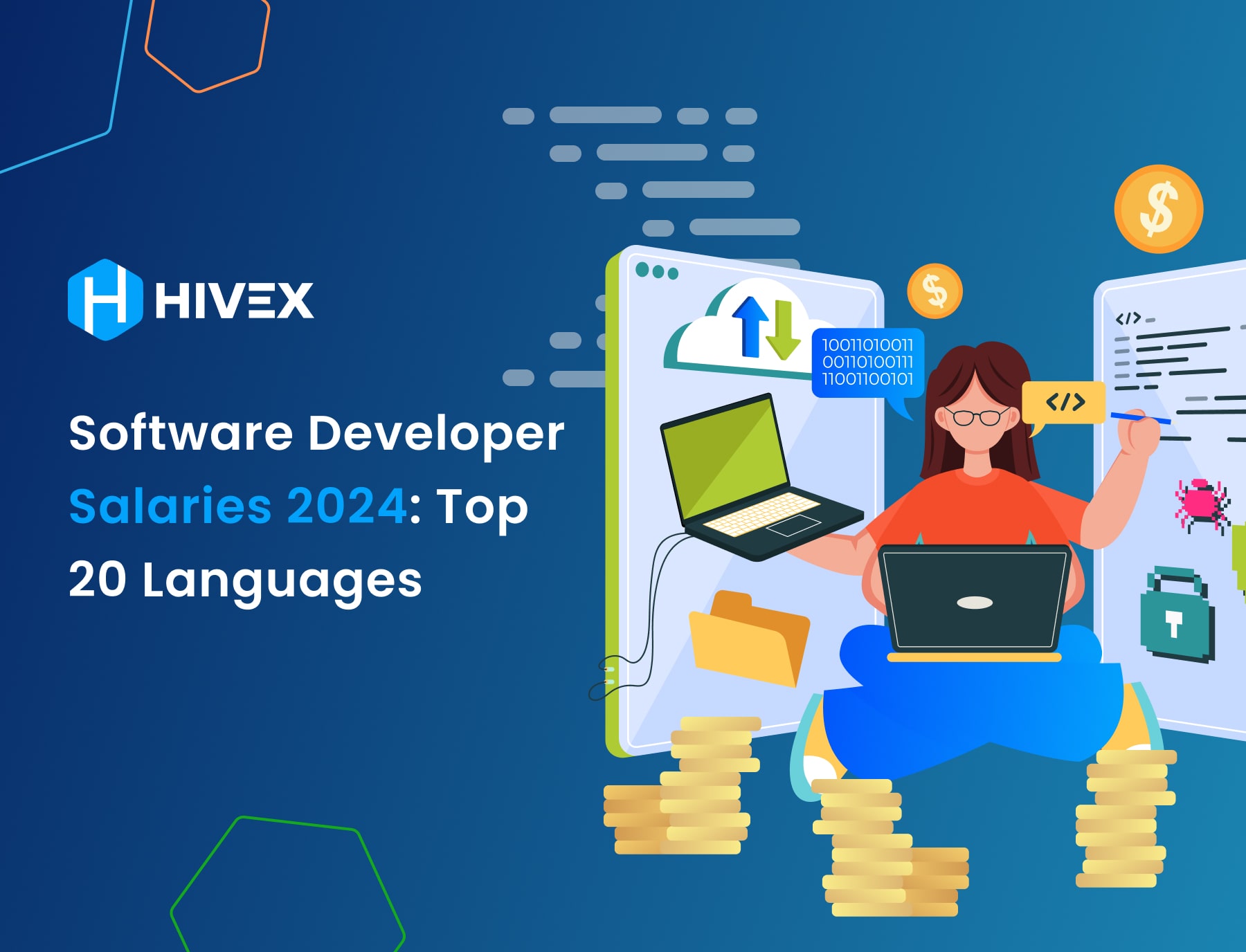Offshore Backend Development Teams: Right Balance of Cost

Offshore backend development can greatly help businesses save money. But how do you make sure you’re getting good work while keeping costs down?
Think about it: You want great developers, but you don’t want to spend too much. Using teams in other countries can be a good answer.
Let’s look at how you can work with skilled developers from abroad without breaking the bank.
We’ll talk about what’s good about it, what problems you might face, and how to find the right mix of quality and cost.
Quick Navigation
Companies ranging from tech giants like Google, Amazon, and Meta to startups and local players are grappling with a challenge: the most severe talent shortage in the past 17 years.
A staggering 77% of employers worldwide are encountering obstacles in filling their vacant positions. Adding to this is the occurrence of substantial layoffs, affecting more than 200,000 employees across 1,000 technology firms.
These statistics hold substantial weight, particularly in the context of hiring top-tier local backend developers in the US. As of the summer of 2023, the average hourly cost for a developer in the US stood at $57.55, equating to $2,302 per week, $9,975 per month, or $119,704 annually.
This figure starkly contrasts with the expenses tied to engaging comparably skilled developers in Asia or Eastern Europe. Despite the allure of such competitive salaries, a staggering 375,000 developing positions remain unfilled in the United States. The scarcity of talent ignites fierce competition among company recruiters.
In response, the market is actively exploring solutions to navigate this predicament, and one promising strategy involves establishing offshore developers teams.
This approach has already extricated numerous IT industry leaders from the labyrinthine challenges of their offshore developer recruitment, retention, and employment, proving to be an invaluable mechanism for house developers and for scaling technology products.
Three Key Challenges Solved by the Offshore Development Team

Cost Optimization
Every client pursues a goal: achieving competitive pricing without compromising on quality. It’s a matter of business payback.
Compare the monthly fees for a highly skilled backend developer in the USA with the equivalent professional in Ukraine, and then scale the costs for the entire team. So, the benefits of hiring offshore developers are evident. Engaging an offshore development team can lead to a cost reduction of operational expenses by over 50%.
It’s important to stress that the more affordable rates of hiring offshore outsourcing teams do not compromise the product’s quality. You pay rates aligned with the specific region and, in return, you onboard highly qualified specialists to your team at a more economical rate.
Shortage of Locally Qualified Personnel
The landscape of the IT sector is dynamic and uneven. There have been numerous shortages of specialists recently in the technology hubs of the United States and Western Europe.
This shortage of offshore developers is exacerbated by the higher cost of their services and the constant migration of talent between companies and regions. These conditions create an unfavorable environment for the successful execution of long-term projects by offshore software developers.
The solution to the staff shortage conundrum lies in harnessing the services and financial resources of offshore backend developer recruitment centers. To address this challenge, all that’s required is establishing well-defined eligibility criteria and selecting a suitable contractor.
This approach opens up access to an unlimited global talent pool, enabling you to overcome personnel shortages.
Rapid Scalability Challenges
Flexibility, scalability, and the ability to swiftly resolve issues despite geographical separation are major advantages of offshore teams. The efficiency of implementing management decisions in offshore companies facilitates seamless team expansion or contraction as needed.
Bureaucratic delays and disruptions to production and business processes are minimized due to a certain degree of production, project management, and autonomy. This autonomy empowers companies to swiftly adapt to changing demands without hindrance, effectively control processes, and focus on business development.
Before you Hire Offshore Developers: Compliance Checklist

We won’t reiterate commonly known facts and provide you with the key insights as a compliance checklist used by Hivex specialists. This checklist forms the foundation of both the technical interview and the assessment of soft skills for candidates. We term it the “3C Compliance”: Culture, Communication, Competencies.
Cultural Compliance:
Cultural fit encompasses the alignment of an applicant’s values and beliefs with those of the company.
- Representation of work ethic
- Willingness to embrace inclusion
- Tolerance
- Commitment to social responsibility
- Responsibility for the results of the work
A robust cultural fit ensures that remote developers assimilate seamlessly into the company’s corporate culture. It enhances motivation and productivity within the team. Conversely, a lack of such alignment should not be overlooked.
Cultural fit in an offshore backend software development team might not yield uniformity. However, for productive and mutually beneficial collaboration, each team member should grasp the driving factors behind the client company.
How to assess
Evaluate the cultural fit of a candidate through questions where the answers’ correctness gradation depends on the company’s culture.
Communicative Compliance:
Effective communication geared towards a shared goal is what transforms disparate specialists into a cohesive team of professionals.
The significance of this trait cannot be understated, and it should rightfully occupy a prominent position among the fundamental prerequisites for a remote developer. While it might sound clichéd, the success of numerous remote teams rests upon adept communication. This is the linchpin for enhancing production processes and introducing novel methodologies.
What to Expect from Your Candidate:
A proficient developer should possess the ability to communicate effectively with clients, employing articulate written and spoken English that aligns with international business standards.
How to assess
Observe the candidate’s interactions with team members, and their speaking and listening skills.
Competencies Compliance:
Competencies form the bedrock of offshore development teams. While the applicant’s knowledge and experience significantly influence their integration into an offshore development team, they don’t exclusively determine success.
Required Expertise Includes:
- Mastery of programming languages like Java, Python, and PHP, along with proficiency in PHP server operations.
- Familiarity with frameworks such as Ruby on Rails, Django, Flask, and Express.
- Proficiency in data structures and algorithms.
- Competence in HTML, CSS, and JavaScript, rendering the specialist a versatile asset.
- Profound understanding of servers.
- Proficiency in APIs, encompassing common formats like XML and JSON.
- Mastery of version control and version control systems.
- A clear grasp of external platforms and technologies, including HTML5, SASS, JavaScript, and CSS3.
How to assess
A technical recruiter will evaluate the developer’s professional competencies during a technical interview, involving a range of practical and theoretical tasks.
Offshore backend developers: Searching, Interviewing, and Onboarding

The process of hiring developers begins well before collecting relevant candidate profiles through sourcing. It commences with defining the business goals of the client company and outlining the tasks the new specialist software engineers will tackle. This provides clarity on the type of specialist or remote developer team required to achieve set objectives.
So, it’s important to determine the suitable hiring approach and where to find the right specialist.
Platforms are key sources for finding freelance developers, serving as versatile hubs for hiring talent from various fields. Freelance platforms like Upwork and Fiverr are particularly in demand because they allow cost-effective acquisition of web development services, often with hourly project-based payments. Opting for platforms is ideal for engaging a freelancer developer for short-term tasks.
Freelance platforms:
- Upwork
- Toptal
- Freelancer
- Fiver
- Codementor
- Peopleperhour
- Other avenues include job search sites like Indeed, LinkedIn, CareerBuilder, Dice, Craigslist, Glassdoor, and ZipRecruiter.
If there’s no immediate need for significant team augmentation, no long-term development projects, and the tasks assigned to the new developer aren’t overly complex, this approach can be beneficial.
For long-term, full-time backend developer positions, the choice lies between direct hiring or collaborating with recruitment agencies. This decision is critical due to the nature of bringing on a valuable specialist for a substantial project on a permanent basis.
The preferred method for sourcing sought-after back-end developers involves either conducting an independent search for the ideal candidate or delegating hiring responsibilities to back-end developers to established recruitment agencies.
Hivex offers comprehensive services encompassing the selection, hiring, and onboarding of qualified backend developers from across the globe.
Here’s a breakdown of our approach:
- Candidate search
- Profiling
- Rigorous interviews to identify top candidates
- Successful candidates are integrated into the project with a guided onboarding process.
Conducting Remote Interviews with Candidates: Essential Tips

During the preparation phase:
- Offer candidates a clear overview of the hiring process, its participants, and its organization.
- Set up technical infrastructure to facilitate comfortable and positive communication.
- Prepare an informative company and position presentation.
- Develop an interview questionnaire tailored to the developer role.
- Schedule interviews at mutually convenient times.
- Confirm candidate availability.
Throughout the interview:
- Foster a trusting atmosphere by introducing yourself and your role, and expressing gratitude for the candidate’s participation.
- Adhere to the interview plan, segmenting it into introductory, technical, and industry-specific questions to maximize efficiency.
- Allow candidates time to contemplate questions and share their insights.
- Coordinate technical assessments and involve technical experts.
After the interview, provide feedback:
- Share preliminary feedback on the initial remote interview with the candidate.
- Outline the next steps, indicating the remaining interview stages and participants.
- If the candidate’s profile requires further evaluation, provide a timeline for feedback.
Furnishing such feedback is vital, as it ensures transparency, aids candidate comprehension of expectations, and pinpoints areas of professional growth. A warm approach, a well-structured communication process, and consistent feedback cultivate a positive company image.
Adaptation and Integration: Strategies for Smooth Onboarding

The process of onboarding remote developers poses challenges due to the inability to replicate in-person experiences. However, with a well-structured onboarding system and appropriate tools, you as project manager can create a positive and informative experience for the new team member.
The onboarding process for hiring offshore developers and backend developers in-house team should incorporate these steps:
- Preparation and distribution of required documents:
- Employment agreement
- Verification and reporting forms
- Non-disclosure agreements
Note: Employ secure electronic signatures for remote onboarding.
- Introduction of a digital employee handbook encompassing:
- Job Responsibilities
- Corporate culture
- Payroll structures
- KPIs and their application principles
- Provision of access to an onboarding platform containing guides and materials.
- Preparation and issuance of development equipment, with corresponding documentation.
- Granting access to internal resources and databases.
- Integration of new team members into internal communication tools.
- Sending a welcoming package to foster a sense of belonging:
- Personalized letter from the team and product manager
- Branded items: mug, notebook, T-shirt, stickers
- Facilitating communication between the new team member and their assigned leader.
Onboarding Process Common Mistakes and How to Avoid Them

Insufficient stringency and objectivity in assessing a candidate’s competencies and skills can lead to several detrimental outcomes for the company.
Improper Vetting and Its Consequences
- Mistakes in the hard skills test can result in the developer’s inability to carry out professional tasks in the future.
- Inadequate English language proficiency might hinder effective communication with the team.
- Lack of necessary remote work experience could disrupt coordinated team workflows.
Hivex Experience
We do not leave gray zones in a candidate’s profile that could pose a risk to the client. After selecting a candidate, our verification specialists conduct a thorough analysis of the candidate’s technological stack, communication skills, and language proficiency through a series of interviews:
- Initial interviews provide insights into the candidate’s personal qualities and English language level, enabling us to evaluate their soft skills.
- Subsequent interviews focus on assessing hard skills with our technical experts.
If both stages are successfully completed, the vetting process concludes, and the candidate is available for collaboration.
Lack of Communication and Absence of Feedback
If a new developer doesn’t receive clear company practice recommendations, they might begin considering companies that are more open to integrating newcomers from day one. A natural extension of communication barriers is the absence of feedback between parties. For productivity and motivation, it’s equally damaging when leaders don’t provide feedback, and managers don’t seek input from new team members.
Hivex Experience
To ensure robust communication between newcomers and their teams, we assign experienced mentors. Their role is to guide new team members through the virtual corridors of company requirements, traditions, and recommendations. They don’t just communicate about the initial professional tasks; they also set role expectations, display hospitality, and encourage newcomers to share impressions and insights. To facilitate this, we conduct periodic calls where new employees:
- Provide feedback on the adaptation process.
- Evaluate the availability of materials and the user-friendliness of the adaptation platform.
- Share impressions and their emotional state after starting work.
Insufficient Training Organization during Onboarding
While in past projects we’ve discussed socialization and cultural integration, developers primarily need to understand the product they’ll be working on. Essentially, this is a learning period and its duration depends on the developer’s experience. Its main goal is to make the new team member autonomous and confident. The absence of up-to-date documentation on the internal structure of the application plays a pivotal role in the development process.
Hivex Experience
To reduce the duration of development costs of training and minimize new hires’ efforts in code refinement app development, we formulate a clear training strategy and provide comprehensive insights into the inner workings of the products. Ongoing contact and feedback from mentors enable developers to unravel and understand the product’s structure more rapidly.
Moreover, Hivex offers the best offshore developers and HR management services, allowing the parent company to maintain a stable connection with offshore employees, ensuring their satisfaction, loyalty, and retention. Legal, financial, and tax policy experts in the offshore country eliminate any obstacles in the parent company’s business operations. In the presence of hire offshore country, we provide:
- Accurate and timely payroll management.
- Tax reporting control.
- Financial reporting submission.
- Transaction processing.
- Medical insurance arrangement.
- Leave and sick day tracking.
- Hiring and dismissal in compliance with the law.
Conclusion
Establishing the Offshore Backend Development Team stands out as a sensible and cost-effective solution in addressing the challenges of scaling, tapping into the worldwide talent pool of talents, and optimizing costs front front-end development.
Use the services of Hivex professional agency to curate offshore teams of skilled backend web developers, right now.
Our approach revolves around a holistic strategy for resolving the intricacies of locating, recruiting, and overseeing an offshore backend team. Through a dedicated emphasis on adherence to regulations, streamlined communication, and proficiency, we ensure a constructive and fruitful collaborative experience for offshore teams and project managers.
Reach out to us to delve deeper into how our services can cater to your unique needs, and to discuss a pricing structure tailored just for you.
FAQ
1. What can I expect from communication when working with offshore backend developers?
Working with offshore backend developers ensures regular updates, prompt replies, and clear discussions about project milestones. These developers overcome time differences and language barriers to maintain effective workflow.
2. How do you ensure the quality of an offshore backend development team?
Quality assurance in offshore backend development relies on thorough code reviews, adherence to international coding standards, and performance benchmarks. Additionally, reputable offshore coding teams often hold certifications and follow industry standards to ensure quality.
3. What is involved in the offshore team assessment process?
Offshore team assessment generally includes evaluating technical skills, project management abilities, and communication skills. This might involve technical tests, interviews, and reviews of past projects to ensure the team can meet your project requirements.
4. How can I trust offshore developers with my company’s sensitive data?
Trusting offshore developers with sensitive data means ensuring they follow strict security measures. This includes adherence to international data protection laws, regular security checks, and the implementation of secure coding practices. Confidentiality agreements and secure access permissions also help protect your data.
5. What are the cost benefits of hiring offshore coding teams compared to local developers?
Hiring offshore coding teams can significantly reduce your project costs without sacrificing quality. These savings come mainly from lower operational and labor expenses in the regions where offshore developers operate. This allows you to use your budget for other important aspects of your project or business growth.


